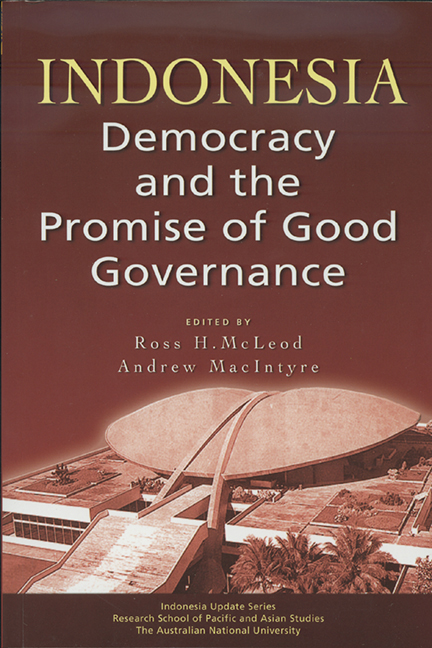Book contents
- Frontmatter
- Contents
- List of Tables and Figures
- List of Contributors
- Acknowledgments
- Glossary
- 1 Introduction
- PART I FORMING AND REFORMING THE ARCHITECTURE of GOVERNANCE
- PART II THE ROLES OF GOVERNMENT
- PART III THE INSTITUTIONS OF GOVERNMENT
- 9 The Civil Service: Towards Efficiency, Effectiveness and Honesty
- 10 The Constitutional Court–s Decision in the Dispute between the Supreme Court and the Judicial Commission: Banishing Judicial Accountability?
- Index
- INDONESIA UPDATE SERIES
9 - The Civil Service: Towards Efficiency, Effectiveness and Honesty
from PART III - THE INSTITUTIONS OF GOVERNMENT
Published online by Cambridge University Press: 21 October 2015
- Frontmatter
- Contents
- List of Tables and Figures
- List of Contributors
- Acknowledgments
- Glossary
- 1 Introduction
- PART I FORMING AND REFORMING THE ARCHITECTURE of GOVERNANCE
- PART II THE ROLES OF GOVERNMENT
- PART III THE INSTITUTIONS OF GOVERNMENT
- 9 The Civil Service: Towards Efficiency, Effectiveness and Honesty
- 10 The Constitutional Court–s Decision in the Dispute between the Supreme Court and the Judicial Commission: Banishing Judicial Accountability?
- Index
- INDONESIA UPDATE SERIES
Summary
INTRODUCTION
In this chapter I outline what civil service reform needs to address and what it should achieve, as well as how it should be implemented to secure progress and sustainable outcomes. The chapter sets out a strategic framework for civil service reform and the objectives to be achieved under such a framework. It is written from a civil service policy-making perspective, focusing on technical solutions based on sound international practices.
I argue that there are two key paths to improved performance:increased transparency and strengthened accountability. I identify two prerequisites for a sustainable improvement in civil service performance and elaborate seven immediate and long-term objectives. All the objectives are important and need to be addressed simultaneously, although they will take varying lengths of time to be achieved. Finally, I argue that successful civil service reform requires a gradual approach, targeting selected key institutions in the early stages. This can be expanded to other targets later as reform gains momentum and good practices can be replicated.
The political dimensions attached to any reform related to the public sector workforce are barely touched on in this chapter, although these will be of utmost importance for decision makers if they decide on a comprehensive program of civil service reform. Clearly political considerations are not always favourable to achieving technical or rational objectives.
Background
The legacy of the authoritarian New Order regime can be characterised briefly as non-transparent processes, underfunded institutions, an inadequately skilled public workforce, and institutionalised corruption reflecting a self-serving and opaque administration. Today, however, Indonesian public institutions are expected to secure democracy, support a market economy and provide good governance. Experience from other countries shows that such a transformation of public institutions needs time, strong commitment, persistent effort and determined leadership. These requirements were not met in Indonesia during the first six years of post-Soeharto government. It was not until President Susilo Bambang Yudhoyono took office in late 2004 that there were indications of a strong commitment to reforms, albeit with some doubt as to the capacity of the government to see them through (see, for example, Basri and Patunru 2006: 316).
- Type
- Chapter
- Information
- IndonesiaDemocracy and the Promise of Good Governance, pp. 159 - 177Publisher: ISEAS–Yusof Ishak InstitutePrint publication year: 2007



